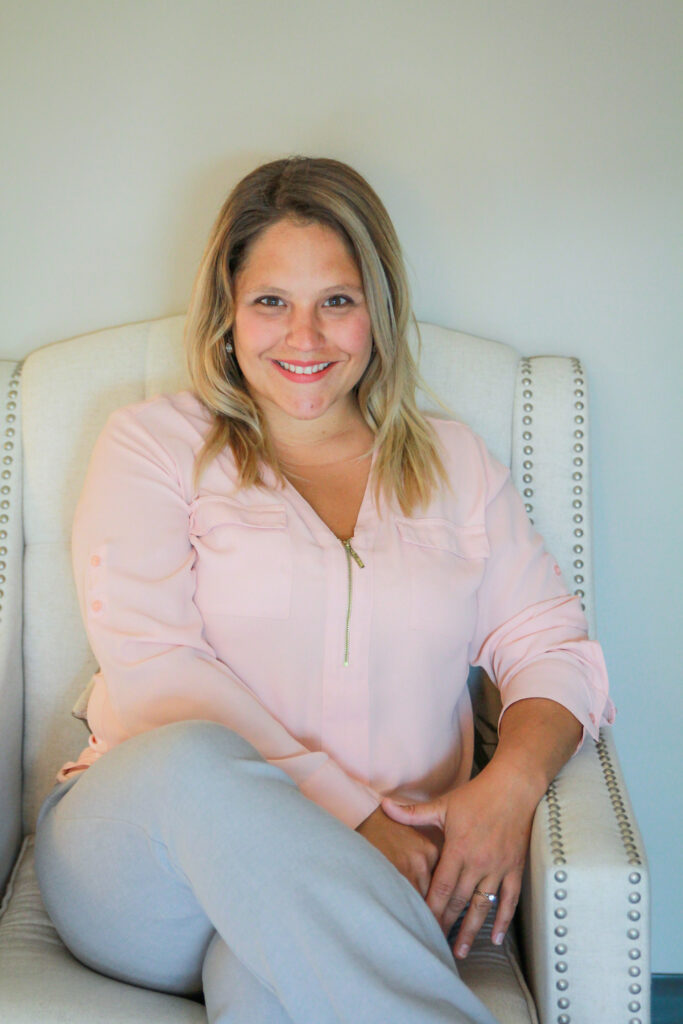Melia shares surprising news: she was recently diagnosed with ADHD, at age 40 😲 We debunk five common myths around ADHD and interview Dr. Michelle Frank, a clinical psychologist who co-wrote a workbook for women with ADHD. Listen on your favorite podcast platform or hit play and stream here.
October is ADHD Awareness Month, and Melia wanted to share some news that came as a complete surprise to her just a few weeks ago: she was diagnosed with ADHD, at age 40. Shortly after that, her 7-year-old son, Evan was also diagnosed, which was much less surprising because he fits into the “boys who bounce off the walls” category that we tend to associate with ADHD.
But it turns out that there are a lot of misconceptions about ADHD, and one of the biggest is that it’s limited to physically hyperactive boys. As of 2020, boys are still more than twice as likely to be diagnosed than girls, not necessarily because boys are more likely to have it, but because ADHD is often missed in girls – and in adults because of the misconception that it only affects kids.
In this episode:
- Melia talks about her experience, the grief and relief she feels with her diagnosis, and the resources and strategies that are helping her
- We debunk five common myths around ADHD
- We interview Dr. Michelle Frank, a clinical psychologist who co-wrote a workbook for women with ADHD

Dr. Frank is a clinical psychologist in Denver, CO who specializes in the diagnosis and treatment of ADHD. She takes an active, empowering, strengths-forward approach based on research to help her clients learn how to live successfully with ADHD – without shame.
Dr. Frank is the co-author of A Radical Guide for Women with ADHD: Embrace Neurodiversity, Love Boldly, and Break Through Barriers, written in collaboration with Sari Solden. She is committed to ADHD advocacy and awareness. She is based at the Enrich Relationship Center of Colorado.
Dr. Frank has ADHD herself and talks about her own symptoms and experiences, common challenges and strengths for ADHDers, and strategies for living successfully with ADHD without shame, accepting yourself fully and using your gifts (many of which are also helpful for neurotypical people).
Two reasons to listen:
- It’s likely that you know someone or are someone with undiagnosed ADHD whose life could change with treatment.
- If you don’t have ADHD but struggle with some of the symptoms, like distractibility and procrastination, you’ll likely find the same kinds of strategies helpful.
Melia’s ADHD Diagnosis
Melia was a people-pleasing kid and a high-achieving student, not disruptive or physically hyperactive. Since high school she has dealt with anxiety and depression but had no idea that ADHD could be the root issue.
The pandemic was the catalyst for her diagnosis. Without her usual coping tools, like going to the gym and seeing friends, and with added stressors like managing her kids’ virtual learning and the distractions of working from home, she has been struggling with productivity and emotional regulation. She felt like she couldn’t get traction on starting and following through on tasks in a reasonable timeframe, and she’d end up most days feeling like a failure.

Melia started reading about ADHD in women, and it was like solving a mystery about herself. When she read ADHD specialist Sari Solden’s symptoms checklist for women, she had so many YESes:
- Is time, money, paper, or “stuff” dominating your life and hampering your ability to achieve your goals?
- Do you often feel as if life is out of control, and that it’s impossible to meet demands?
- Do you feel like you’re always at one end of a deregulated activity spectrum — either a couch potato or a tornado?
- Do you start each day determined to get organized, and end each day feeling defeated?
- Have you watched others of equal intelligence and education pass you by?
- Do you despair of ever fulfilling your potential and meeting your goals?
According to Dr. William Dodson, there are three main areas affected by ADHD, and Melia checks all these boxes:
- Cognitive: Having trouble with executive function – in areas like working memory, planning and problem-solving, time management, and sequencing the order of operations
- Emotional: Being hardwired to be several magnitudes more sensitive than others to perceived rejection, criticism, or failure; difficulty with self-control
- Hyperarousal: Juggling several thoughts at a time, inner and outer restlessness, being fidgety, and often have trouble powering down to sleep
After receiving an ADHD diagnosis from a psychiatrist, Melia felt both grief and relief. On one hand, she wishes she’d had an early diagnosis because ADHD may be the source issue for many mental health challenges she’s dealt with – like anxiety and depression. But she mainly felt relieved to find the missing piece to the puzzle that she’d always been searching for. And she wants to be clear that there’s no blame involved on anyone for missing it — many internal symptoms are invisible to others, and ADHD is commonly misunderstood.
Dr. Dodson calls ADHD diagnosis a “happy diagnosis” because compared with other conditions – where the goal of treatment is to get you back to the way you were pre-diagnosis – with ADHD treatment, you end up thriving more than you ever have in your life.
Gill’s Experience with ADHD
ADHD is a spectrum disorder, meaning that people can have it in varying degrees, from mild – where the symptoms make functioning more challenging – to severe, where you may not be able to function in school, work, or life in general. And no two cases of ADHD will look exactly alike.
We both took an assessment developed by ADHD specialist Sari Solden, and Gill reported some symptoms, though Melia’s scores suggested that hers were around twice as severe.
Gill is reading Solden’s groundbreaking book Women with Attention Deficit Disorder; the first book that was written on ADHD in women, and relates to some of the descriptions – distractibility or jumping from task to task, having tons of ideas but a hard time following through, feeling overwhelmed and like she’s not making any progress. In the past she’d chalked a lot of it up to my perfectionism or sensitivity, or all the distractions and devices of modern living, but had never even considered ADHD.
In the self-assessment in the book, which is broken into several categories, like time, money and stuff, emotions, and history, she connected strongly to a short list of questions:
- Is time, money, paper, or “stuff” dominating your life and hampering your ability to achieve your goals?
- Do you have difficulty prioritizing?
- Can a request for “one more thing” put you emotionally “over the top”? (omg so much)
- Do you often feel overloaded or depleted?
- Do you feel that your mind is hyperactive, always thinking of new ideas?
- And one about childhood: Were you clumsy, bumping into things a lot? (Ha! Were?)
Other areas of the assessment felt more situational – yes, sometimes, usually when she’s under stress.
If you’re interested in exploring a diagnosis for yourself or a loved one, read up on it, and if the criteria fit, schedule a consultation with a medical or mental health professional. It’s important to be diagnosed as early in life as possible because untreated ADHD can have serious consequences like anxiety, depression, poor self-care and high-risk behavior that can actually shorten your lifespan. This is a highly treatable condition with tons of resources to help.
5 Common Myths About ADHD
Myth #1: ADHD isn’t a real medical disorder.
The reality: It’s true that our modern lifestyle of quick-changing digital devices, instant gratification, and too much sugar has made a lot of us distracted and demanding. But ADHD has been described in medical literature as far back as 1775.
ADHD is brain-based and highly heritable – if you have it, you’re likely to have a parent, child, and/or other relatives who also do. Melia’s son Evan was diagnosed shortly after she was, so they’ve been on this learning journey together, and we have since found out that several of our other relatives have it.
Myth #2: ADHD is caused by too much TV and video games, bad parenting, and/or sugar.
The reality: The research is clear that none of these causes ADHD. ADHD is genetic, and children and adults with ADHD seem to have low levels of dopamine, which controls the brain’s ability to maintain attention, regulate emotion, and take action for rewards.
Myth #3: Kids who can focus on something for hours, do well in school, and don’t disrupt class can’t possibly have ADHD.
The reality: ADHDers have interest-driven brains, which means they’re unstoppable when something fascinates them but have trouble giving attention to things that don’t. They may also work hard to compensate for their difficulties and do well within structured environments like school. Melia was a high achiever but put in many hours of studying, and she felt anxious and stressed a lot of the time.
Myth #4: Kids with ADHD eventually outgrow their condition.
The reality: ADHD is a chronic, brain-based condition – which means that you’re born with it and have it your entire life, though the severity of your symptoms can impair you more during different stages of life. Kids usually become less hyperactive as adults, for example, but can still struggle with regulating their attention.
Myth #5: People with ADHD won’t achieve much in life.
The reality: There are a lot of strengths that come with ADHD. ADHDers tend to be curious, funny, generous, open, and have the superpower of hyperfocus. There’s a long list of high achieving people with ADHD in various fields: Mozart, Ben Franklin and Emily Dickinson were thought to have ADHD. Athletes like Michael Phelps and Simone Biles, musicians like Solange Knowles and Justin Timberlake, actors like Zooey Deschanel and Emma Watson, political consultant James Carville, journalist Lisa Ling, and business mogul Sir Richard Branson.
ADHDers are three times likelier to start their own businesses than neurotypicals. A Forbes article on entrepreneurs with ADHD says, “Some of the trait’s most common characteristics – creativity, multi-tasking, risk-taking, high energy and even resilience– are, in fact, strengths when leveraged in the right way and in the right career … the gene associated with ADHD is sometimes called the “explorer gene.”
Get In Touch
Did you recognize yourself or a loved one in our conversation who may have undiagnosed ADHD? And if you have been diagnosed, what has most helped you thrive? Email us at podcast[at]semitogether.com or send us a voice memo.
You can support the podcast by becoming a patron on Patreon. If you haven’t already, please subscribe, rate, and review this podcast on Apple Podcasts or wherever you listen. And sign up for our e-newsletter to make your inbox happy.
Resources
- Connect with Dr. Michelle Frank:
- About ADHD–Overview, CHADD
- Data & Statistics About ADHD: CDC
- ADHD Statistics – New Facts & Research, ADDitude Magazine
- ADHD Symptoms in Women, ADDitude Magazine
- Who Can Diagnose ADHD?, ADDitude Magazine
- More Than Just Genes: How Environment, Lifestyle, and Stress Impact ADHD, ADDitude Magazine
- What Is Executive Function? 7 Deficits Tied to ADHD, ADDitude Magazine
- ADHD Is Different for Women, The Atlantic
- Decades of failing to recognize ADHD in girls has created a “lost generation” of women, Quartz
- How women and girls with ADHD are given short shrift with treatment, other forms of help, Washington Post
- Stop the Cycle of Shame for Girls with ADHD, ADDitude Magazine
- ADHD: The Entrepreneur’s Superpower, Forbes
- How to ADHD YouTube channel
- Famous People with ADHD, ADDitude Magazine
- A Radical Guide for Women with ADHD: Embrace Neurodiversity, Live Boldly, and Break Through Barriers, by Michelle Frank, PsyD and Sari Solden, MS
- Women With Attention Deficit Disorder, by Sari Solden, MS